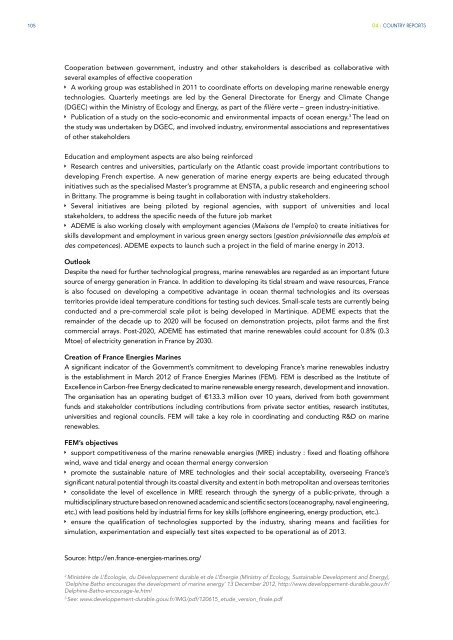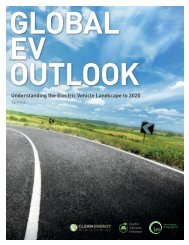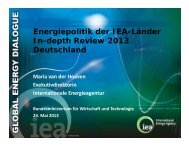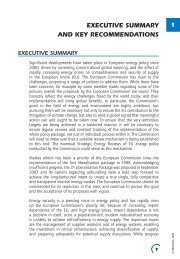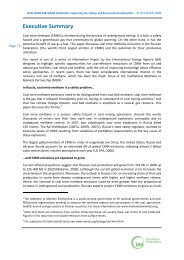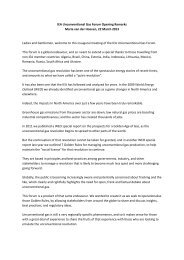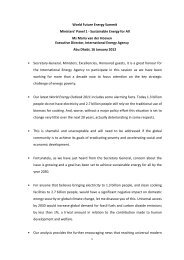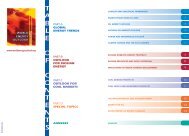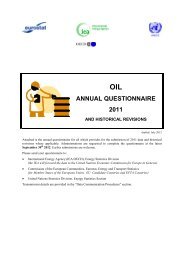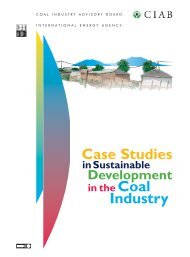OES Annual Report 2012 - Ocean Energy Systems
OES Annual Report 2012 - Ocean Energy Systems
OES Annual Report 2012 - Ocean Energy Systems
You also want an ePaper? Increase the reach of your titles
YUMPU automatically turns print PDFs into web optimized ePapers that Google loves.
105<br />
04 / COUNTRY REPORTS<br />
Cooperation between government, industry and other stakeholders is described as collaborative with<br />
several examples of effective cooperation<br />
ÌÌ<br />
A working group was established in 2011 to coordinate efforts on developing marine renewable energy<br />
technologies. Quarterly meetings are led by the General Directorate for <strong>Energy</strong> and Climate Change<br />
(DGEC) within the Ministry of Ecology and <strong>Energy</strong>, as part of the filière verte – green industry-initiative.<br />
ÌÌ<br />
Publication of a study on the socio-economic and environmental impacts of ocean energy. 3 The lead on<br />
the study was undertaken by DGEC, and involved industry, environmental associations and representatives<br />
of other stakeholders<br />
Education and employment aspects are also being reinforced<br />
ÌÌ<br />
Research centres and universities, particularly on the Atlantic coast provide important contributions to<br />
developing French expertise. A new generation of marine energy experts are being educated through<br />
initiatives such as the specialised Master’s programme at ENSTA, a public research and engineering school<br />
in Brittany. The programme is being taught in collaboration with industry stakeholders.<br />
ÌÌ<br />
Several initiatives are being piloted by regional agencies, with support of universities and local<br />
stakeholders, to address the specific needs of the future job market<br />
ÌÌ<br />
ADEME is also working closely with employment agencies (Maisons de l’emploi) to create initiatives for<br />
skills development and employment in various green energy sectors (gestion prévisionnelle des emplois et<br />
des competences). ADEME expects to launch such a project in the field of marine energy in 2013.<br />
Outlook<br />
Despite the need for further technological progress, marine renewables are regarded as an important future<br />
source of energy generation in France. In addition to developing its tidal stream and wave resources, France<br />
is also focused on developing a competitive advantage in ocean thermal technologies and its overseas<br />
territories provide ideal temperature conditions for testing such devices. Small-scale tests are currently being<br />
conducted and a pre-commercial scale pilot is being developed in Martinique. ADEME expects that the<br />
remainder of the decade up to 2020 will be focused on demonstration projects, pilot farms and the first<br />
commercial arrays. Post-2020, ADEME has estimated that marine renewables could account for 0.8% (0.3<br />
Mtoe) of electricity generation in France by 2030.<br />
Creation of France Energies Marines<br />
A significant indicator of the Government’s commitment to developing France’s marine renewables industry<br />
is the establishment in March <strong>2012</strong> of France Energies Marines (FEM). FEM is described as the Institute of<br />
Excellence in Carbon-free <strong>Energy</strong> dedicated to marine renewable energy research, development and innovation.<br />
The organisation has an operating budget of €133.3 million over 10 years, derived from both government<br />
funds and stakeholder contributions including contributions from private sector entities, research institutes,<br />
universities and regional councils. FEM will take a key role in coordinating and conducting R&D on marine<br />
renewables.<br />
FEM’s objectives<br />
ÌÌ<br />
support competitiveness of the marine renewable energies (MRE) industry : fixed and floating offshore<br />
wind, wave and tidal energy and ocean thermal energy conversion<br />
ÌÌ<br />
promote the sustainable nature of MRE technologies and their social acceptability, overseeing France’s<br />
significant natural potential through its coastal diversity and extent in both metropolitan and overseas territories<br />
ÌÌ<br />
consolidate the level of excellence in MRE research through the synergy of a public-private, through a<br />
multidisciplinary structure based on renowned academic and scientific sectors (oceanography, naval engineering,<br />
etc.) with lead positions held by industrial firms for key skills (offshore engineering, energy production, etc.).<br />
ÌÌ<br />
ensure the qualification of technologies supported by the industry, sharing means and facilities for<br />
simulation, experimentation and especially test sites expected to be operational as of 2013.<br />
Source: http://en.france-energies-marines.org/<br />
2<br />
Ministére de L’Écologie, du Développement durable et de L’Énergie (Ministry of Ecology, Sustainable Development and <strong>Energy</strong>),<br />
‘Delphine Batho encourages the development of marine energy’ 13 December <strong>2012</strong>, http://www.developpement-durable.gouv.fr/<br />
Delphine-Batho-encourage-le.html<br />
3<br />
See: www.developpement-durable.gouv.fr/IMG/pdf/120615_etude_version_finale.pdf


